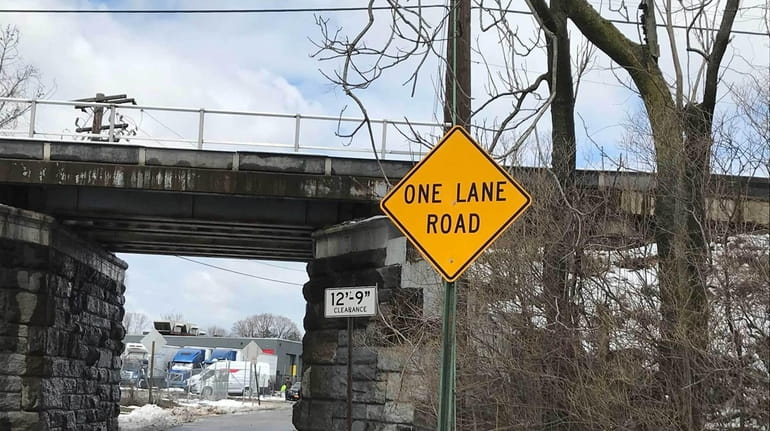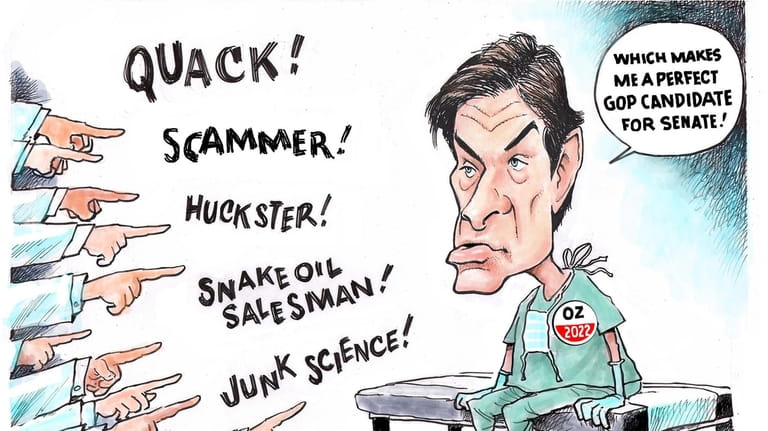Court to Garden City: Let Third Track work proceed

A judge has ordered Garden City to issue the permit for the MTA to rebuild the Denton Avenue Bridge, which is required to complete the LIRR's Third Track project. Credit: Metropolitan Transportation Authority
Daily Point
Third Track back on track?
After months of an ugly back and forth, a Nassau County Supreme Court judge has ordered the Village of Garden City to "process and approve" the necessary permit so the Metropolitan Transportation Authority can begin to reconstruct the Denton Avenue Bridge, work that’s required to complete the Long Island Rail Road’s Third Track project. The order also requires the village to authorize the closing of the road beneath the bridge for as long as the project requires.
"Here, the completion of the Denton Avenue Bridge Project, the last of eight bridge replacements needed for the $2.6 billion Third Track Project, is critical," Nassau County Supreme Court Justice Helen Voutsinas wrote in the decision dated Nov. 30 and posted Thursday. "Finally, as to a balancing of the equities, the Court finds no harm expressed by the Village, and in fact, the Village stands to benefit from the Denton Avenue Bridge Project."
Garden City officials did not return calls for comment and it’s unclear whether the village plans to appeal. But MTA officials said they’re looking forward to receiving the permit and starting the work.
"I’m just hopeful we get the permits and we can work together and bring this to a close and to the finish line, rather than being adversarial," Third Track project executive Anthony Tufano told The Point Thursday. "Get in a room and work with us to deliver this thing, which benefits everyone, including their residents."
The order came as the village and the MTA had made progress over the last several days. With increased involvement from State Sens. Kevin Thomas and Anna Kaplan, Gov. Kathy Hochul’s office and others, the village, which hadn’t allowed the MTA to even file a permit application previously, finally opened the door to allow an application to be filed. Other permits — for sewer and elevator work — were approved this week, Thomas said. But until the court decision, the future of the bridge and the Third Track project remained uncertain.
The decision, Thomas told The Point, "shows how important this project is to Long Island, from how many jobs it will create to the overall effect on the quality of life of Long Islanders."
"This was a good decision and I’m looking forward to working on this issue in the future," Thomas added.
The MTA had warned of potential delays to the Third Track schedule due to the village’s refusal to issue the permit. With this order, as long as the village issues the permit quickly and doesn’t appeal, Third Track should stay on track to be done by the end of next year as scheduled. That’s particularly important for Hochul, who has supported Third Track, along with related projects like the East Side Access connection to Grand Central Terminal and the new Elmont Long Island Rail Road station.
With green signals ahead for those projects, now the question is whether Hochul can move forward on the host of other big transit items on her agenda.
If only a single court order could make the Second Avenue Subway or Penn Station’s overhaul a reality.
— Randi F. Marshall @RandiMarshall
Pencil Point
Dr. Oz for Senate

Credit: PoliticalCartoons.com/Dave Granlund
For more cartoons, visit www.newsday.com/nationalcartoons
Final Point
East End is still hot
Just when you thought the pandemic-fueled East End real estate market might be cooling off, now comes a reminder that this market never really cools off.
The Peconic Bay Community Preservation Fund, fueled by a 2% tax on East End real estate sales, took in $18.49 million in October. That was more than the $17.93 million garnered in October 2020, when the market was blazing with folks escaping New York City.
"I think the highest month we ever had was $21 million," Assemb. Fred Thiele (I-Sag Harbor), who co-sponsored the legislation that created the CPF, told The Point. "We’re not at the highest numbers but $18 million is still probably one of the 10 highest months in the history of the program."
Thiele said a variety of factors are keeping demand hot, including the pandemic ("People still want to be here," Thiele said), a near-record level of Wall Street profits as outlined recently by state Comptroller Thomas DiNapoli, mortgage rates that still sit below 3%, and the usual flurry of fall closings after summer renters decide they’d really like to buy.
"Combine it all and that creates a luxury real estate market that’s still rather robust," Thiele said. "People at that end of the economic spectrum have been least affected by COVID."
CPF revenues for the first 10 months of the year are $177.37 million, a whopping 73% more than the $102.61 million collected during the same period in 2020. Thiele said the only time he’s seen the market cool off was after the Great Recession. And that didn’t last long.
"I feel like every third day I see a house in Southampton sold for $45 million," Thiele said. "The high-end transactions have driven a lot of the increase. That part of the market continues to be very, very robust, and that’s kind of always been the case. It’s just accelerated by the pandemic."
And there’s no sign that anyone is hitting the brakes.
— Michael Dobie @mwdobie
